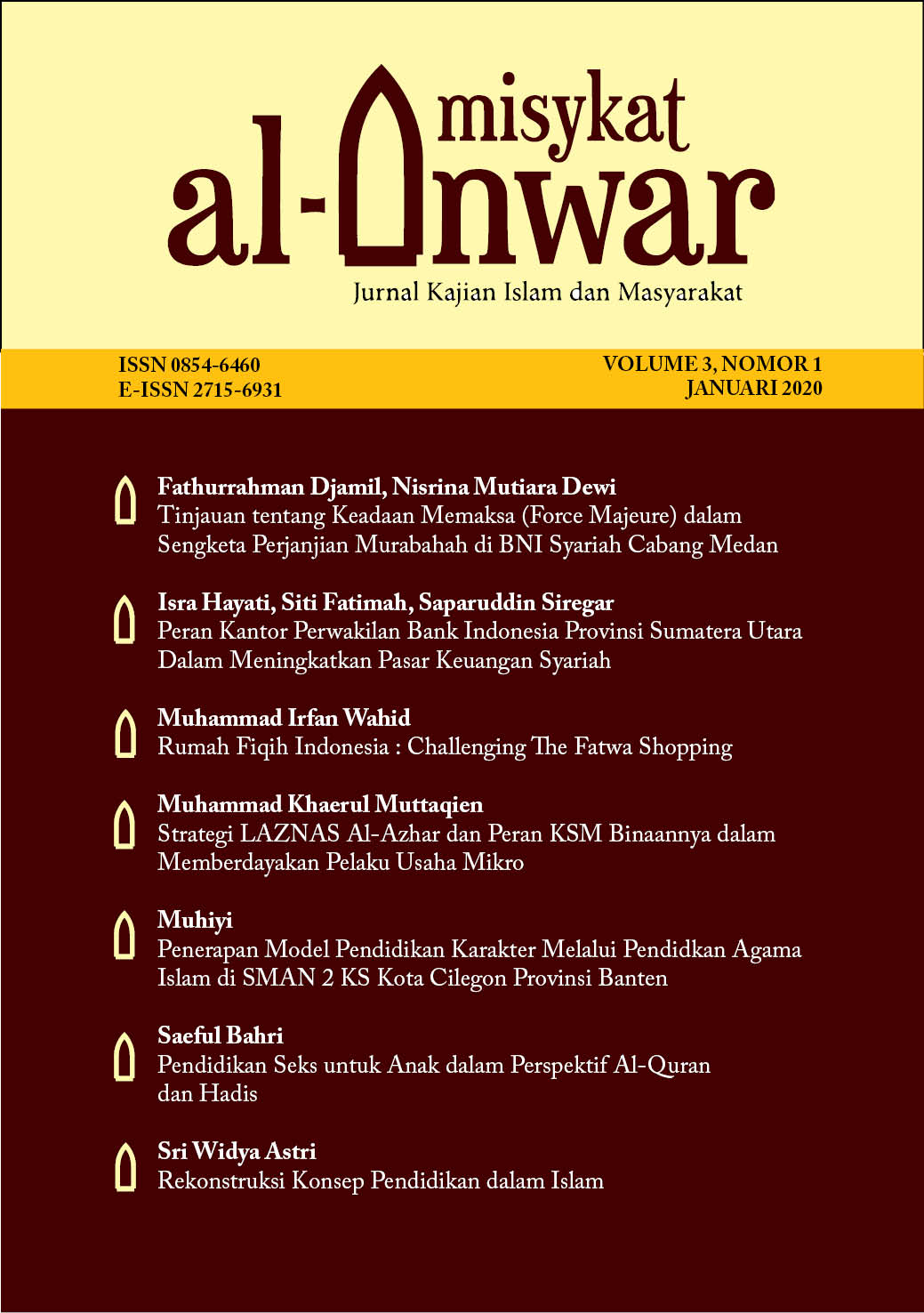Rumah Fiqih Indonesia : Challenging The Fatwa Shopping
Main Article Content
Abstract
Article Details
All manuscripts published in the Misykat al-Anwar Journal of Islamic Studies and Society are entirely the property of the author, as for the entry and unpublished script of the journal, the copyright is wholly the property of the author.
All manuscripts published in the Misykat al-Anwar Journal of Islamic Studies and Society are open to the public by following the provisions of the CC-BY-NC-SA (Attribution Non Commercial Share Alike) platform where everyone is allowed and permitted to adapt, the results of the study with the provision should provide citation credit to the author (citation) not for commercial purposes, and one must make a similar provision to the results of his research.
---
Semua naskah yang diterbitkan dalam Misykat al-Anwar Jurnal Kajian Islam dan Masyarakat sepenuhnya menjadi hak milik penulis, adapun naskah yang masuk dan belum diterbitkan oleh jurnal, hak cipta sepenuhnya milik penulis.
Semua naskah yang diterbitkan dalam Misykat al-Anwar Jurnal Kajian Islam dan Masyarakat terbuka untuk umum (open access) dengan mengikuti ketentuan platform CC-BY-NC-SA (Attribution Non Commercial Share Alike) semua orang diperbolehkan untuk menyadur, merujuk dan mengadaptasi tulisan/hasil penelitian dengan ketentuan harus memberikan kredit rujukan kepada penulis (citation) bukan untuk kepentingan komersial, dan seseorang harus melakukan ketentuan yang serupa terhadap hasil penelitiannya.
References
Al-Asyqar, Muhammad Sulaiman. (1976). Al-Futya wa Manahij Al-Fatwa Bahts Ushuliy. Kuwait: Maktabah Al-Manar Al-Islamiyyah.
Al-Kandari, Ali A & Ali Dashti. (2014). Fatwa and the Internet: A Study of the Influence of Muslim religious scholars on internet diffusion in Saudi Arabia. Promotheus: Critical Studies in Innovation. Vol.32. No.2.
Al-Maliki, Muhammad Ali Husain Al-Makki. (1999). Dhawabith Al-Fatwa Man Yajuzu Lahu An Yuftiya wa Man La Yajuzu Lahu An Yuftiya. Alexandria: Dar Al Furqan.
Al-Qardhawi, Yusuf. (1997). Fatwa Antara Ketelitian dan Kecerobohan. Terj. As’ad Yasin. Jakarta: Gema Insani Press.
Bunt, Gary R. (2003). Islam in the Digital Age: e-Jihad, Online Fatwas and Cyber Islamic Environment. London: Pluto Press.
Hosen, Nadirsyah. (2008). Online Fatwa in Indonesia: From Fatwa Shopping to Googling a Kiai, in Greg Fealy and Sally White (ed.) Expressing Islam: Religious Life and Politics in Indonesia. Singapore: Institute of Southeast Asian Studies.
Illar, Derek John. (2010). Cyber Fatwas and Classical Islamic Jurisprudence. The John Marshall Journal of Information Technology & Privacy Law. Vol.27. No. 4. Summer 2010.
Jati, Wasisto Raharjo. (2016). Cyberspace, Internet, dan Ruang Publik Baru: Aktivisme Online Politik Kelas Menengah Indonesia. Jurnal Pemikiran Sosiologi. Vol.3. No.1. Januari 2016.
Kamali, Mohammad Hashim. (1991). Principles of Islamic Jurisprudence. Cambridge: Islamic Text Society.
Petersen, Jakob Skovgaard. (1997). Defining Islam for The Egyptian State Muftis and Fatwas of the Dar Al-Ifta. Leiden: Brill.
Sarwat, Ahmad. (2014). Ushul Fiqih Ringkas. Jakarta: Rumah Fiqih Publishing.
Situmorang, James R. (2012). Pemanfaatan Internet Sebagai New Media Dalam Bidang Politik, Bisnis, Pendidikan dan Sosial Budaya. Jurnal Administrasi Bisnis. Vol.8 No.1.
Websites
Asosiasi Penyelenggara Jasa Internet Indonesia (APJII). Hasil Survei Penetrasi dan Perilaku Pengguna Internet Indonesia 2018. Retrieved 28 June, 2019, from https://apjii.or.id/content/read/39/410/Hasil-Survei-Penetrasi-dan-Perilaku-Pengguna-Internet-Indonesia-2018
Rumah Fiqih Indonesia. Mengapa Rumah Fiqih Selalu Menampilkan Perbedaan Pendapat?. Retrieved July 2, 2019, from http://www.rumahfiqih.com/konsultasi-1428272774-mengapa-rumah-fiqih-selalu-menampilkan-perbedaan-pendapat.html/
Rumah Fiqih Indonesia. Bolehkah Memilih Pendapat Yang Mana Saja?. Retrieved July 2, 2019, from http://www.rumahfiqih.com/konsultasi-1400924947-bolehkah-memilih-pendapat-yang-mana-saja.html/
Youtube. Kenapa Sekolah Fiqih?. Retrieved July 16, 2019, from https://youtu.be/03beRD2xBeY
